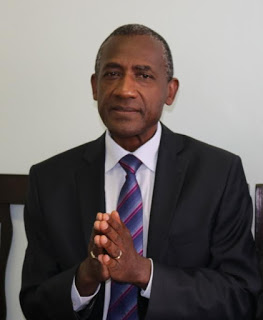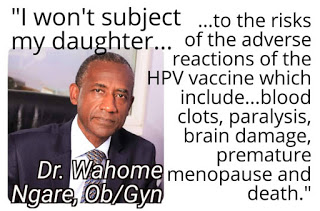KENYA: To Vaccinate or Not to Vaccinate: Why Kenyan Catholic Doctors Reject HPV Vaccine

Dr. Wahome Ngare, Gynecologist
Cynthia Nyambare* is a Kenyan mother of two daughters aged 12 and 14 years; the daughters perfectly fit the age bracket of girls targeted for the Human Papilloma Virus (HPV) vaccination launched by the Kenyan government on October 18 in the Coastal City of Mombasa.
However, Cynthia’s response to whether she wants them vaccinated or not is an emphatic no. Concerns have been raised by the Kenya Catholic doctors about the vaccine and this has made Cynthia and many other Kenyans uncertain about the vaccine and therefore hesitant towards it. Others have totally rejected it and vowed not to have their girls subjected to it.
Most Rev. Martin Kivuva Musonde, Archbishop of Mombasa under whose jurisdiction the vaccine was launched cautioned the government about the vaccine saying that it has side-effects which must be considered even as the campaign is rolled out. However, the Catholic Doctors in Kenya under their umbrella body, Kenya Catholic Doctors Association have completely rejected the vaccine.
“Having cancer is a very scary experience, it involves a very painful treatment process. You need a lot of moral, spiritual and psychological support and most of all, it is financially draining because the cost of treatments is extremely high,” says Rev. Father Andrew Kaufa, Coordinator of AMECEA Social Communications Department, who is a cancer survivor.
Father. Kaufa who was diagnosed with the cancer in in 2004 went through chemotherapy and radio therapy at Nairobi Hospital in 2005 and was declared free of cancer cells in 2008 said that if the vaccine has no issues in relation to his Catholic faith, then he would certainly go for it. However, in relation to HPV vaccine, the Malawian priest feels that there is need to investigate the allegations and the concerns raised by the Catholic Doctors in Kenya before subjecting anybody to it.
“The Catholic Church encourages us to go to the hospitals when we fall sick. However, we must realize that there are some solutions which the hospitals offer which go against our Catholic faith. When it comes to such, it is better to consult even with the moral theologians and stand by one’s faith. After all, we must remember what Pope John Paul II said that there is a moment when as Christians we have to accept suffering in life,” Father Kaufa said.
It is apparent that cancer is a crisis because many people are dying out of it, while many families are affected by the scourge. If therefore an opportunity to prevent the disease arises, then why are the Kenyan Catholic doctors opposing it? Among the nine countries in AMECEA Region, Kenya becomes sixth to launch the Human Papilloma Virus (HPV) Vaccine after Uganda, Tanzania, Ethiopia, Malawi and Zambia. Apparently there seems to be no opposition from Catholic Doctors from these other AMECEA countries where the vaccine has been launched, what reasons then do the Kenya Catholic doctors give for their opposition?
Dr. Wahome Ngare a gynecologist and member of the Kenya Catholic Doctors Association explains that the vaccine is for human papilloma virus and not for cancer as has widely been portrayed.
“There are 150 known varieties of human papilloma virus, out of these, 16 are known to be associated with cancer. The HPV vaccine has four strains out of the 16 that are supposed to reduce the risk of cancer and whether you get vaccinated or not, you are still required to go for pap smear test every three years which is what we have always used to prevent cancer,” Dr. Wahome explained.
Secondly, the medic indicated that human papilloma virus is a sexually transmitted disease. Therefore, those who are sexually involved are the ones at risk of contracting it. Anyone who is not sexually involved have no risk at all of contracting the virus. As such, the vaccine among girls who are not expected to be sexually active virtually raises a number of moral questions.
“Those who end up getting infected by the human papilloma virus, 99.85% of them end up without cancer. This is because the human body destroys the virus naturally. This is a medically documented fact. Just natural immunity, no drugs, no vaccines. This leaves us with 0.15% of the population that develops persistent HPV infection. Now, persistent HPV infection is known that if it continues in 8 to 10 years, then one may develop cervical cancer,” Doctor Wahome explains.
He expressed that traditionally, women who are sexually active have always been advised to go for pap smear test in every three years because the test would pick up the changes that may lead to cancer 8 to 10 years before the cancer onset, and a very small treatment of the cervix is usually available to prevent cancer. Dr. Wahome and his colleges from the association therefore feels that it is totally pointless to subject people to a vaccine where the target group would only be 0.15 percent of the population.
“When it comes to primary health, prevention of diseases are classified into three: the contagious diseases that spread by droplets by ways of a cough or sneeze. These include contagious diseases such as TB and measles and everybody is at risk of contracting them. It is therefore very important for the population to be vaccinated because there is no way you can know who has the disease.”
The second category of diseases, Dr. Wahome explains, are the contagious diseases that are spread by the fico-oral route such as contaminated water and contaminated food. These include cholera and typhoid and when it comes to primary health, there is need to educate the population about cleanliness when handling food and water as well as proper waste disposal. This is a mandatory as a preventive measure. However, for diseases such as polio where the effects are so severe, immunization is necessary; otherwise proper hygiene is enough to eliminate those two conditions.
The third category of contagious diseases are those that are spread sexually for instance HIV/AIDS gonorrhoea, Syphilis, Hepatitis B, and Human Papilloma virus among many others.
 “These diseases are spread because of behaviour and what primary healthcare providers should do is to enlighten the community about the need for self-discipline. People need to be made aware that they are getting such disease because of their sexual habits. Therefore, it is best for unmarried people to wait until marriage and if married then being faithful to one’s spouse is paramount.”
“These diseases are spread because of behaviour and what primary healthcare providers should do is to enlighten the community about the need for self-discipline. People need to be made aware that they are getting such disease because of their sexual habits. Therefore, it is best for unmarried people to wait until marriage and if married then being faithful to one’s spouse is paramount.”
However, there are rare cases when people need to be vaccinated against such diseases. According to Dr. Wahome, medics for instance who are in contact with various patients suffering from such diseases as Hepatitis B, are justified to get vaccinated.
“If you say I am a doctor and I am handling many patients with Hepatitis B infections and there is a risk I could get injured during surgery and get infected because the disease spread the same way as HIV, then I can take Hepatitis B vaccine to reduce my risks of getting infected. Otherwise you don’t just go vaccinating the whole community, it doesn’t make sense.”
Finally, Dr. Wahome alleges that HPV vaccine has very bad side effects among them being that it may cause paralysis.
“The vaccine can cause brain damage leading to paralysis and there are documented facts to that effect. It causes premature menopause and, to some extent, death. In countries like the UK where they have been using it since 2006, it is reported to have caused the highest rate of complications as reported to the National Complication Reporting structures. It has more reported complications than all the other vaccines put together. So, hurting these young girls that’s is a big concern,” Dr. Wahome indicated.
Other AMECEA Countries where the vaccine has so far been launched include Uganda where the launch took place in Kasese District on 26th November 2015, targeting all girls nationwide within the age of 9-13 years. Tanzania launched the vaccine on 10th April, 2018 while Ethiopia did it on 3rd December, 2018 in Lideta Sub-city of Addis Ababa and targeted over one million girls who are 14 years of age. In Malawi, the vaccine was launched at St. Charles Lwanga Primary School Ground on 10th January, 2019 in Mangochi District. While in Zambia, it was launched in May 2008 targeting girls from the ages 9-10.
NB: * Some names have been changed to protect the individual for fear of victimization owing to the sensitivity of the matter
∽End∽
By Pamela Adinda, AMECEA Online News


